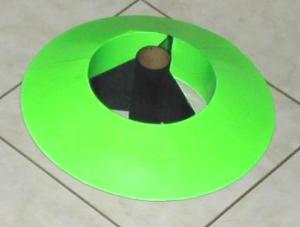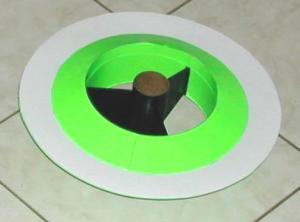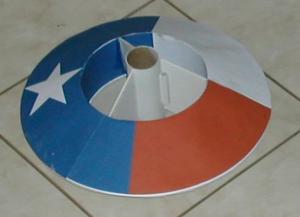Art Applewhite Rockets Flying Saucer 38mm (12")
Art Applewhite Rockets - Flying Saucer 38mm (12") {Kit}
Contributed by Dick Stafford
| Construction Rating: | starstarstarstarstar_border |
| Flight Rating: | starstarstarstarstar |
| Overall Rating: | starstarstarstarstar |
| Manufacturer: | Art Applewhite Rockets  |
 Brief:
Brief:
Art has continued to expand his line of saucers, adding a 12-inch saucer with a 38mm motor mount and either a 1/4-inch launch lug or optional ACME conformal rail guide. The recommended motors include the Ellis Mountain H48, all Aerotech 38/240 RMS, and all Cesaroni Pro38 one and two grain motors. This kit would serve nicely as quick, easy, and inexpensive way to Level-1 certification. Add a 29-38 adapter (not provided or recommended by the manufacturer) and you could add G80’s and G125’s to this list.
Construction:
The parts are all good quality and include:
- Six sheets of colored, 110 lb card stock comprise the top, bottom and core assemblies
- One sheet of pre-marked, foam poster board to make the center plate.
- One thick walled 38mm motor tube
- 1/4-inch launch lug
- 3-inch x 8-inch x 3/32-inch basswood fin stock
- 1 7/8-inch self-adhesive, fiberglass drywall joint tape
Tools and materials required:
- Scissors
- X-acto knife
- Elmer’s white glue
- Devcon 2 Ton Epoxy ($1.97 at Walmart)
- Clear enamel (RUSTOLEUM Crystal Clear or equivalent)
- Fine sandpaper
There are six pages of detailed instructions with plenty of diagrams. White glue is first used to assemble the top and bottom cones and two cylindrical core assemblies (after a substantial amount of clipping with sharp scissors, of course). The bottom core must slide over the top core so it is test-fit before gluing. Unlike its smaller cousins, the saucer uses a foam board sheet in place of the plastic plates used in Art’s smaller saucers. The lines for the circular cuts are all pre-drawn, and you really need a new, sharp blade to make the cuts. There is also a circle drawn just inside of the outer rim. You cut through just one side of the foam circle and form a bevel on the outer edge. Some sanding is required to clean up this piece, and you must test fit it with the top and bottom cores before gluing. It took some effort and sanding for these components to fit together.
 Art also provides strips of self-adhesive, fiberglass drywall joint tape to reinforce the top cone. Although the instructions say this step is optional, it is required for H flights and the only recommended G motors are the Cesaroni one grainers. I recommend you use the tape even if you only plan to fly on Gs. It doesn’t add that much weight, but makes the saucer far more sturdy. Anyway, rockets tend to like to eat the largest motor that they can.
Art also provides strips of self-adhesive, fiberglass drywall joint tape to reinforce the top cone. Although the instructions say this step is optional, it is required for H flights and the only recommended G motors are the Cesaroni one grainers. I recommend you use the tape even if you only plan to fly on Gs. It doesn’t add that much weight, but makes the saucer far more sturdy. Anyway, rockets tend to like to eat the largest motor that they can.
Once everything fits, you spread epoxy inside all the sub-assemblies, slide them together, and clamp them by placing a suitably sized bowl on top. To prevent bleed-through on the cardstock, I suggest you use the Devcon 2-ton epoxy recommended in the instructions.
The fin can assembles with white glue (I used carpenter’s glue for this step) like any other set of fins. The basswood fin stock is nice and easy to work with. Finally, the fin unit is glued in place, completing the assembly.
Finishing:
Since it is winter and painting must me kept to a minimum, I sealed the fins with Fill-and-Finish and hand-painted the fin can black. As recommended, I sealed the pre-colored cardstock with clear enamel.
Construction Rating: 4
 Flight:
Flight:
I flew the saucer on a Cesaroni H153, with the ejection charge removed. To hold the motor in on decent, I simply used a couple of wraps of masking tape around the motor's thrust ring and the rear of the motor mount.
Man, this saucer really scooted on this motor, flying arrow-straight to an impressive altitude. I was speechless and the crowd clapped. The saucer fell bottom first most of the way, but started to tumble just before it landed. There was no damage.
Note: This rocket also comes in the "Texas Special" design as seen above.
Flight Rating: 5
Summary:
The saucer was easy to build but it took some effort to get the components to fit prior to final assembly. In all, it was just a tad more challenging than Art's smaller saucers.
This saucer gave a truly exciting flight. And for a $30, mostly paper, L-1 saucer - not bad at all!
 |
 |
Sponsored Ads
 |
 |





![Calling Marshall Applewhite [Explicit] Calling Marshall Applewhite [Explicit]](https://m.media-amazon.com/images/I/51MeUaBWTkL._SL500_.jpg)





W.A. (July 21, 2004)